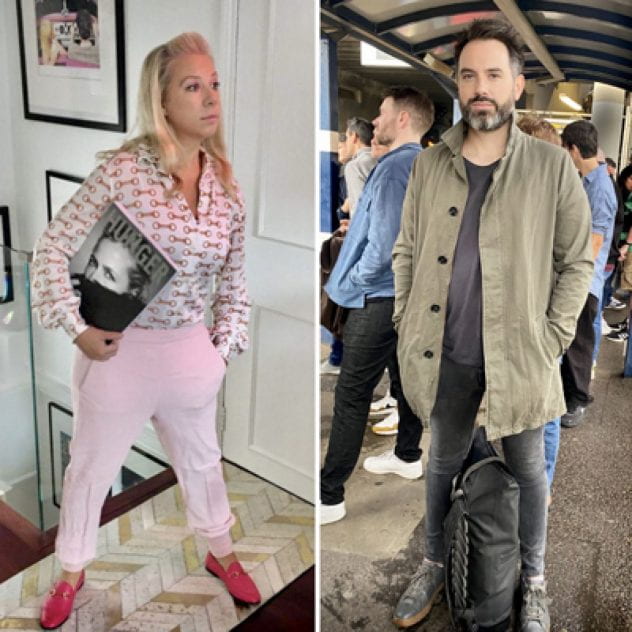
Anna Tsekouras and Pete Austin, the brains behind Anon Agency
Even though we’re surrounded by brands 24/7, branding is sometimes a difficult concept to understand. The reality is that good branding can be the difference between a successful company and an unsuccessful one. And building up ‘brand equity’ in an audience (the measurable ‘value’ of a brand) is something industries spend trillions of dollars on—because if you have a consistent, authentic brand which your audience trusts, there’s no end to where you can go.
Here are some quick branding tips which are just as relevant whether you’re running an in-house campaign, launching your own business or running a global brand…
- Think about your audience
Audience, audience, audience. It doesn’t matter whether you’re one store with an audience of people within 1.5km of your outlet, or a global brand with an audience of millions, you have to think about who your audience is. Consider why they would want to interact with your brand, and what you want them to do and feel when they see your brand. Who are they? What do they like to do in their spare time? What media do they consume? Audience insights can feel overwhelming, but there are ways to do it in a scaled-back way which means you can create ‘personas’ of the audience you’re looking to reach. You can then plug these into your marketing on platforms like Meta.
- Know yourself — be authentic
Authenticity is absolutely key for every brand. If you’re inauthentic, audiences will see through you very quickly. There are so many examples of when brands have fallen foul of deviating from their authentic voice or purpose. Audiences don’t want to feel like they’re being taken for a ride. The most successful brands find an ‘authentic voice’ and ‘authentic vision’ and stick to it.
- Create a strong visual identity
The Nike tick. The McDonald’s golden arches. The Chanel interlinking Cs. The Nickelodeon orange splat. All brand agencies will tell you that a brand is about more than the logo, but it doesn’t mean the logo and a strong visual identity isn’t vital. If it’s done well, your visual brand (colours, fonts, imagery) and creative mark can do a lot of the heavy-lifting for your brand and how it makes your audience feel.
- Consider all elements of ‘brand’
Although a logo is obviously a vital brand touchpoint (see above!) branding is everything which makes your audience think or feel a certain way. For example the ‘brand’ for a restaurant must consider basic things like menu colours, logos and fonts – but also it’s the ‘physical brand’, so the type and volume of music, scents, quality of cutlery, staff uniforms, levels of lighting, the greeting guests receive etc. Think about how different it feels to sit in a burger joint than a high-end restaurant.
- Be consistent
Branding is nothing without consistency. Of course, companies can ‘re-brand’ which changes their look and feel, but the core tenets of a brand should not fundamentally change. With every brand you’re aiming to build your ‘brand equity’ —this is the ‘value’ you add to your company or organisation through branding and the association your audience has with it. This is built up over time, and conversely can be lost overnight if not handled properly.
- Don’t skip the basics: Vision and Mission
There are vital Brand ‘building blocks’ you simply cannot skip. Your Vision is your ‘why’ and your Mission is your ‘what’. Defining a brand mission is usually pretty straightforward, but it can sometimes take much longer to define the Vision. We’ve seen clients take months to come up with their Vision statement – but once it’s done, it’s a core part of everything the business does. It’s usually why the Vision is front and centre on organisations’ websites or in staff induction packs.
- Identify your point of difference
Brands can become obsessed with competitors — this is something we wouldn’t advise. It’s important to know your competitors and what they’re offering, but you should spend more time working out what is different about YOU. It’s this point of difference that is the essence of your brand. It’s what sets you apart from the rest, and the centre point from which you can build out the rest of your brand.
- Know your limits — don’t overreach
When you’re working on a brand it’s easy to get carried away; especially if it’s your own brand or company which you’ve poured countless resources into. But we’ve seen clients licence IP for trainers and energy drinks for their brand before they’ve thought about their Vision statement. Branding is a process, and if you follow the right steps you’ll end up with a strong and clear brand. And if you look at any successful business, a strong and clear brand is always at the heart of it. Resist the temptation to get distracted and move too quickly, overlooking the important bits of branding.
- Don’t be afraid of failure
We hear every day from clients: “we have to get this right”. It’s true, of course. But we always tell them “we’ll get it wrong a few times first”. There’s no way that any brand ever stumbled across its final iteration without rounds and rounds of edits (and probably arguments!). From re-written Vision and Mission statements, to logo changes — brand is an evolution. If you want to get it right the first time, you’re probably going to be disappointed!
- Get help!
Branding is a conundrum. It can sometimes seem like the most simple thing in the world, but at the same time feel totally overwhelming when you’re not getting it right. We see it every day with clients. Getting a good brand agency or expert to help steer you through branding for your product, company or campaign is vital – and definitely pays dividends in the long run. You often live and breathe your brand, and getting an outside view can give you the perspective you need.
About the Authors
Pete Austin and Anna Tsekouras are the dynamic duo behind Anon, a story-led brand agency. Since launching in late 2020 the Agency has created new brands from scratch for a number of start-ups as well as taking existing small businesses through to funding rounds. Both qualified journalists with over twenty years’ experience on newspapers and national magazines, they transferred their story-driven skills into communications, brand and PR where they worked on major partnerships and campaigns across national government, higher education, charity and the arts. Some of the organisations, clients and businesses Anna and Pete have worked on brand briefs or partnerships with: UAL, Goldsmiths University of London, Hayward Gallery, IBM, Barclays, British Airways, Barbican, Grayson Perry, Design Museum, British Museum, TATE Modern, VICE, Bustle, Evening Standard, BBC, DAN’S and Public Offerings Ltd.
They also teach our intensive Branding A to Z short course at City.
Sign up for Intro to Branding HERE. Next course starts Feb 26 — BOOK NOW.
See what other writing courses we have on offer HERE.
Or browse our full range of short courses HERE.






Recent Comments